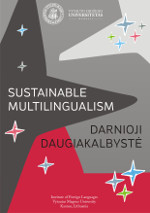Preserving Languages Beyond The Political Dimension: Some Proposals For A Dialect Planning
Preserving Languages Beyond The Political Dimension: Some Proposals For A Dialect Planning
Author(s): Andrea BerniniSubject(s): Language and Literature Studies
Published by: Vytauto Didžiojo Universitetas
Keywords: dialect planning; language planning; language policy; language rights; Intangible Cultural Heritage
Summary/Abstract: In the last few years a growing attention on the preservation of languages has developed, thanks to initiatives of language planning, which imply inter alia the recognition of an idiom as a language at the political level. This view follows the dichotomy between those idioms that are official languages of institutions and those which h do not have such status, i.e. dialects. However, the difference between languages and dialects being socio-linguistic and not linguistic tout court, the efforts for preserving languages should not take the official status as a reference point. In addition, since it is very unlikely to give the same official status to a large number of languages, a different solution should be envisaged for non-official languages. Thus, they could be preserved through initiatives that can be named as dialect planning, the main purpose of which is not spreading a language in all domains but its preservation. Dialect planning is analysed in this study considering its five steps: (1) corpus planning that entails, first of all, language documentation; (2) status planning that implies some protections without entailing the recognition of the status of official language in the light of the linguistic rights; (3) prestige planning that counterbalances the ‘weaker’ status of dialects with respect to languages, by instilling in speakers the awareness that idioms are fundamental parts of cultures; (4) acquisition planning that identifies the strategies carried out for teaching a language; and (5) family language planning aimed at strengthening the family language transmission.
Journal: Darnioji daugiakalbystė
- Issue Year: 2014
- Issue No: 4
- Page Range: 14-24
- Page Count: 11
- Language: English

